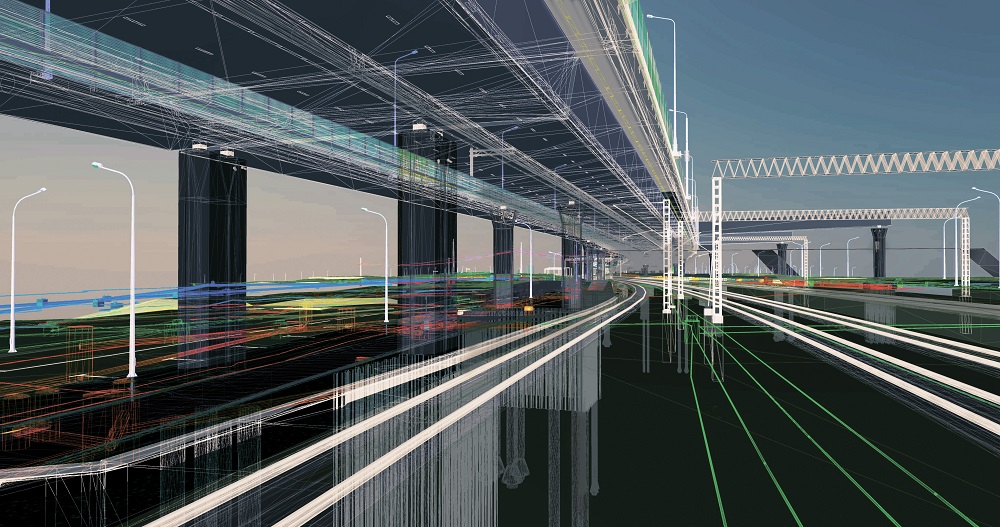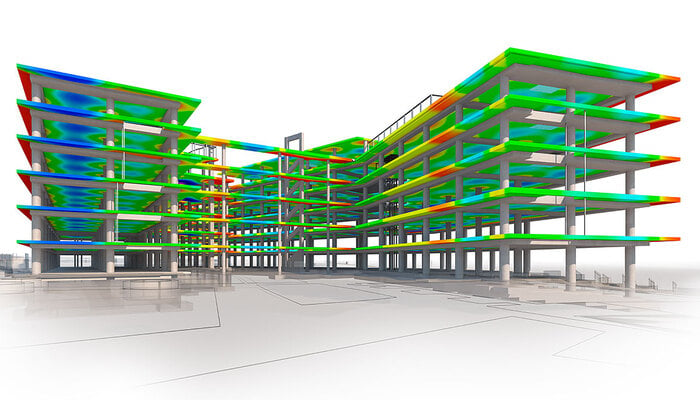5 Best BIM Courses for Civil Engineers in Mumbai in 2026

Table of Contents
The Architecture, Engineering and Construction (AEC) Industry is undergoing rapid changes and adopting technology actively across all sectors. Today, Building Information Modelling (BIM) has become an indispensable part of the industry and more and more engineering professionals are understanding its significance. BIM is a collaborative approach to creating virtual project models that can help speed up the construction work.
Don’t worry if you don’t know what BIM is and what BIM courses are for civil engineers. We’ve got you covered! Read on to learn about what BIM is for civil engineers, its benefits, and the top BIM courses in Mumbai for civil engineers.
What is BIM for Civil Engineers?
BIM is a transformative technology that has gained widespread adoption in civil engineering. BIM for civil engineers represents a paradigm shift in how they plan, design, construct, and manage infrastructure projects. You can leverage BIM digital tools and data to create collaborative and integrated engineering projects.
How Civil Engineers Can Use BIM:

1. Digital Representation of Infrastructure
BIM involves creating a multidimensional representation of the physical and functional characteristics of projects digitally. It serves as a shared knowledge centre of information for stakeholders on which they can make informed decisions during a project’s life cycle. You can also use BIM to simulate the construction process and identify potential issues in advance.
2. Collaboration and Communication
BIM fosters collaboration among all stakeholders involved in the project, including architects, engineers, and contractors. It provides a common platform where all stakeholders can interact and work together seamlessly, reducing miscommunication and errors.
3. Improved Design and Analysis
You can use BIM to create and analyse multiple design scenarios quickly. You can assess the structural integrity of the designs, leading to more optimised design creation. Besides, you can also make informed decisions about materials, leading to easier and more accurate cost estimates, an invaluable aspect of project budgeting.
4. Clash Detection and Coordination
With BIM software, you can detect clashes and conflicts between different project components, such as structural elements and electrical systems. This can ensure all components fit together as intended and prevent costly errors during the construction phase.
5. Sustainability and Environmental Analysis
BIM allows you to assess the environmental impact of the design, including its energy consumption, carbon emissions, and water usage. This aids in developing more sustainable and eco-friendlier infrastructure. BIM also plays a crucial role in ensuring compliance with local building codes and regulations. The transparent record of design decisions and changes can be crucial during regulatory reviews.
6. Maintenance and Asset Management
The applications of BIM go beyond the construction phase. They provide a platform for asset management, helping operators keep track of maintenance schedules and asset performance. You can also hand over the digital data and documentation generated during the design and construction phases to the owner for facility management and renovation purposes.
Benefits of BIM in Civil Engineering

BIM for civil engineers is a game-changer. It enhances project efficiency, reduces risks, and improves overall project quality. It empowers you to make data-driven decisions, collaborate effectively, and ensure the long-term sustainability and functionality of the designs you build. As technology continues to evolve, BIM is likely to play an imperative role in civil engineering practices.
BIM has numerous benefits for civil engineers, transforming the way infrastructure is designed, constructed, and managed. Take a look at some key advantages of BIM for civil engineers:
1. Career Advancement
BIM plays a pivotal role in advancing the careers of civil engineers. By harnessing the power of BIM, you can efficiently manage complex projects, streamline collaboration with multiple stakeholders, and optimise design and construction processes. This enhances project outcomes and demonstrates your ability to deliver exceptional projects.
By being proficient in BIM, you demonstrate your adaptability and readiness to embrace technologies, making yourself highly competitive in the market. Furthermore, sustainability and efficiency are becoming increasingly crucial in civil engineering projects. Your ability to design environmentally friendly structures further boosts your career prospects.
2. Technological Competency
BIM significantly enhances your technological competency - you learn to harness software tools that improve your digital proficiency. The software provides you with a digital environment that integrates various aspects of the project - design, data management, and collaboration tools. This technology-driven approach allows you to simulate and analyse complex structures, assess potential issues before the construction phase, and make well-informed decisions that benefit the project.
Your ability to learn technology-driven tools improves your efficiency and accuracy of work and keeps you at the forefront of technological advancements, which are very much preferred in the industry.
3. Innovative Exploration
BIM serves as a catalyst for innovative exploration in civil engineering projects. With such a dynamic platform, you can visualise innovative designs and experiment with them. Using BIM, you can also refine your concepts in a multidimensional and data-rich environment. This fosters creativity and innovation, allowing you to explore alternative designs and construction methods with no to little effort.
Furthermore, with BIM, you can integrate technologies like Virtual Reality (VR) and Augmented Reality (AR) that can enhance your ability to visualise and interact with the projects better. In all, BIM encourages you to push the boundaries of traditional practices and create more efficient, sustainable, and resilient solutions.
Most Demanded BIM Courses for Civil Engineers in Mumbai
Mumbai is a hub for construction and infrastructure development in India, and there is a growing demand for skilled professionals with BIM skills. BIM courses in Mumbai can provide you with the necessary skills and knowledge to stay competitive in the market. Several BIM courses for civil engineers are offered in Mumbai, and you must choose the one considering factors like the reputation of the training provider, the curriculum’s relevance, and the opportunities for hands-on practice. You must also look for BIM modelling courses that offer networking opportunities and job assistance.
So, if you are wondering which institute is best for BIM courses in Mumbai, below are the top institutes that offer BIM courses for civil engineers:
1. BIM Professional Course for Civil Engineers by Novatr
Duration: 7 months
Mode of Study: Online
Build a future-ready career in construction with Novatr’s BIM Professional Course for Civil Engineers, a hands-on, industry-aligned program designed to help you master Building Information Modeling (BIM) from design to execution. Learn how top global firms use BIM to plan, coordinate, and deliver smarter, more efficient projects, while gaining the technical confidence to work on large-scale infrastructure and building developments.
Here’s what you’ll learn:
- 5+ industry softwares, including Autodesk Revit, Navisworks, Autodesk Construction Cloud: Docs, Coordination & Collaboration.
- Master essential plugins such as EF-Tools, DiRoots.One, pyRevit, ProSheets, Issue and Model Checker for Revit to automate documentation and improve precision.
- Learn complete BIM workflows, from digital design development, estimation & BOQ, and information modeling to clash detection, sequencing, and multidisciplinary coordination.
- Get hands-on experience working on real commercial and residential projects following ISO 19650 standards, guided by mentors from the global AEC industry.
- Develop professional construction documentation, audits, and deliverables aligned with international BIM practices.
Earn globally recognized certifications:
- Novatr Course Certificate, signed by the Academic Director.
- Autodesk User Certification, validating your command over Autodesk tools.
- NSDC Certificate, officially recognizing your BIM expertise.
- Optional Specialization Certificates, for learners who wish to deepen their skills in niche BIM applications.
Also Read - 5 Top BIM Courses in Hyderabad for Civil engineers
2. BIM-Ready+ by TechnoStruct Academy
Duration: 8 months
Mode of Study: Online
BIM-Ready+ is a holistic BIM management program offered by TechnoStruct Academy. It is a triple certificate program, where you will be awarded three certificates – a post-graduation certificate, a BIM project management certification from Bexel India, and a work experience certificate from TechnoStruct LLC, California. In this course, you will be taught 12+ BIM software by industry experts along with the appropriate methodologies to use during the project life cycle.
The BIM course civil engineers consists of eight modules – BIM management, 3D BIM-Model Authoring, 3D BIM-Model Coordination, 4D BIM-Time and Schedule, 5D BIM-Cost and Budget, 4D/5D BIM Progress Monitoring, cutting-edge technology, and lastly, a live project internship. The academy also offers lifetime placement assistance.
3. Master’s in Global BIM Management by ZIGURAT
Duration: 12 months
Mode of Study: Online
Master’s in Global BIM Management is a double-degree program by ZIGURAT Institute of Technology. This BIM course in Mumbai is designed to train you to manage BIM projects using the latest technologies, software, and tools. You will be working on the Final Master Thesis (FMT) from the beginning in a simulation-based environment. The course has five blocks (modules) – BIM management, BIM for design, BIM for construction, BIM for asset management, and BIM implementation.
4. PG Diploma in BIM by IIIC
Duration: 12 months
Mode of Study: Online
Post-graduate diploma in BIM offered by the Indian Institute of Infrastructure and Construction focuses on emerging practices in BIM. This one-year program comprises two semesters, including three months of structured internship.
During the diploma program, you will learn BIM software like Revit, Navisworks, BEXEL Manager, and GIS. You will acquire knowledge and skills on modelling projects – from conception to execution. This BIM course for civil engineers in Mumbai is structured to create 4D simulations and guarantees internships in reputed construction firms during the course.
5. CAD and BIM Course by Guvi
Duration: 5 months
Mode of Study: Online
The CAD and BIM course offered by Guvi (IIT Madras & IIM Ahmedabad incubated company) is a live online course accredited by Autodesk. This BIM course in Mumbai will get you access to live online classes on weekends and lifetime recorded videos. This program offers instant doubt-clearing sessions with mentors and placement support. You will also get to work on real-life industry projects to build your resume.
The course includes BIM software like AutoCAD, Revit, and STAAD.pro. The program has eight modules - AutoCAD Civil, BIM, Revit Architecture, STAAD.pro, Civil Design Analysis & CAD Design with Python Scripting, and final assessment and projects. The last two modules are certification and preparation for an interview. The BIM course for civil engineers also offers dedicated mentorship from industry experts, 24/7 doubt support, revision sessions, mock interviews, and periodic assessments.
Also Checkout, BIM Courses for Civil Engineers residing in Pune, Kerala, Delhi and Bangalore
Conclusion
Conclusively, we can point out that BIM has become an indispensable part of the AEC industry, and anyone involved in the industry must know what BIM is for civil engineers. BIM has transformed civil engineering by improving collaboration, streamlining workflows, and enhancing project outcomes. The adoption of BIM in the civil engineering industry will continue to grow. So, it is crucial to enrol for a BIM course for civil engineers in Mumbai to stay ahead of the competition.
Enrol yourself today for a BIM course for civil engineers by Novatr and learn 10+ BIM software to give your career the much-needed boost. Also, head toward our recourses page to learn more about BIM and the latest industry trends.
FAQs
1. How much does a BIM Course cost in Mumbai?
BIM Course Fees in Mumbai depends on various factors such as duration and mode. Moreover it also depends on the toolkit provided and placement assistance. On average BIM Course Fees in Mumbai ranges from INR 1.8 lakhs to 2.5 lakhs.
2. What is the eligibility criteria for BIM Course in Mumbai?
Civil engineering and architecture students can opt for the Bim course in Mumbai to give headstart to their careers. Moreover, BIM courses also serve professionals who want to upskill, switch career paths and are looking at better job opportunities with salary perks.
3. Which are the best BIM institutes in Mumbai
If you are looking for the best BIM course for civil engineers in Mumbai, Novatr stands out for its structured BIM Professional Course for Civil Engineers which offers 10+ software coverage, live capstone projects, and strong placement support. It is especially suitable for engineers who want a clear BIM career path. Other options like TechnoStruct Academy, ZIGURAT, IIIC, and Guvi also offer BIM-focused programs, but Novatr is often preferred for its industry-backed, specialization-first approach.
4. What is the Revit course fees in Mumbai?
Revit course fees in Mumbai vary based on course depth and whether Revit is taught as a standalone tool or as part of a larger BIM course for civil engineers. Short Revit-only modules at local training centers may start from around ₹15,000–₹40,000. Comprehensive BIM programs that include Revit along with other software, live projects, and placement support can range between ₹1.5 lakh and ₹3 lakh, depending on the institute and curriculum.
5. Is BIM a good career? And does it pay well?
Yes, BIM is a very promising career for civil engineers and architects, especially in cities like Mumbai, where infrastructure and real estate are growing fast. BIM skills are in demand across design firms, contractors, and global AEC companies. BIM roles such as BIM Engineer, BIM Coordinator, and BIM Manager often offer higher salaries than traditional CAD-only roles, along with better global mobility, faster career growth, and opportunities to work on complex, high-value projects.

 Thanks for connecting!
Thanks for connecting!





.png)





